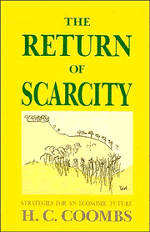Book contents
- Frontmatter
- Contents
- Introduction
- 1 Towards a Sustainable Society
- 2 Scarcity, Wealth and Income
- 3 Matching Ecological and Economic Realities
- 4 Science and Technology - For What Purpose?
- 5 Economic and Ecological Issues in Resource Management
- 6 Resource Management and Environmental Law
- 7 The Quality of life and Its Assessment
- 8 Is Democracy Alive and Well?
- 9 Technology, Economic Change and Political Strategy
- Bibliography
2 - Scarcity, Wealth and Income
Published online by Cambridge University Press: 05 August 2012
- Frontmatter
- Contents
- Introduction
- 1 Towards a Sustainable Society
- 2 Scarcity, Wealth and Income
- 3 Matching Ecological and Economic Realities
- 4 Science and Technology - For What Purpose?
- 5 Economic and Ecological Issues in Resource Management
- 6 Resource Management and Environmental Law
- 7 The Quality of life and Its Assessment
- 8 Is Democracy Alive and Well?
- 9 Technology, Economic Change and Political Strategy
- Bibliography
Summary
Originally presented as paper when President of the Australian Conservation Foundation, at Hobart, Tasmania, October 1978. Subsequently presented at the Centre for Resource and Environmental Studies, Australian National University, Canberra, ACT, January 1979.
SCARCITY - particularly in relation to the world's non-renewable resources - is becoming an increasingly important factor in the working of the economic system. While a vast flood of economic analysis and speculation has followed the recognition of that scarcity, as reflected in the dramatic increases in 1973 in the world prices of crude oil, little of it has dealt with the effects of that rise on the distribution of the final product of the economic system between the groups of people who compose it. I believe it is the differential effects of such scarcities on the distribution of wealth and incomes between these groups which are already posing and will increasingly pose the most difficult problems and call for the most dramatic revision of human values and expectations.
Classical economists during the nineteenth century devoted a great deal of attention to the way in which the shares of capital, labour and proprietorship of land were determined. In the United Kingdom, where agricultural land tended to be owned by a class of people who did not themselves use it in production but hired it out to farmers, questions about how the rewards of the landowner were determined and whether those rewards were socially justifiable, constituted important elements in economic and political controversies of the time.
- Type
- Chapter
- Information
- The Return of ScarcityStrategies for an Economic Future, pp. 21 - 38Publisher: Cambridge University PressPrint publication year: 1990



